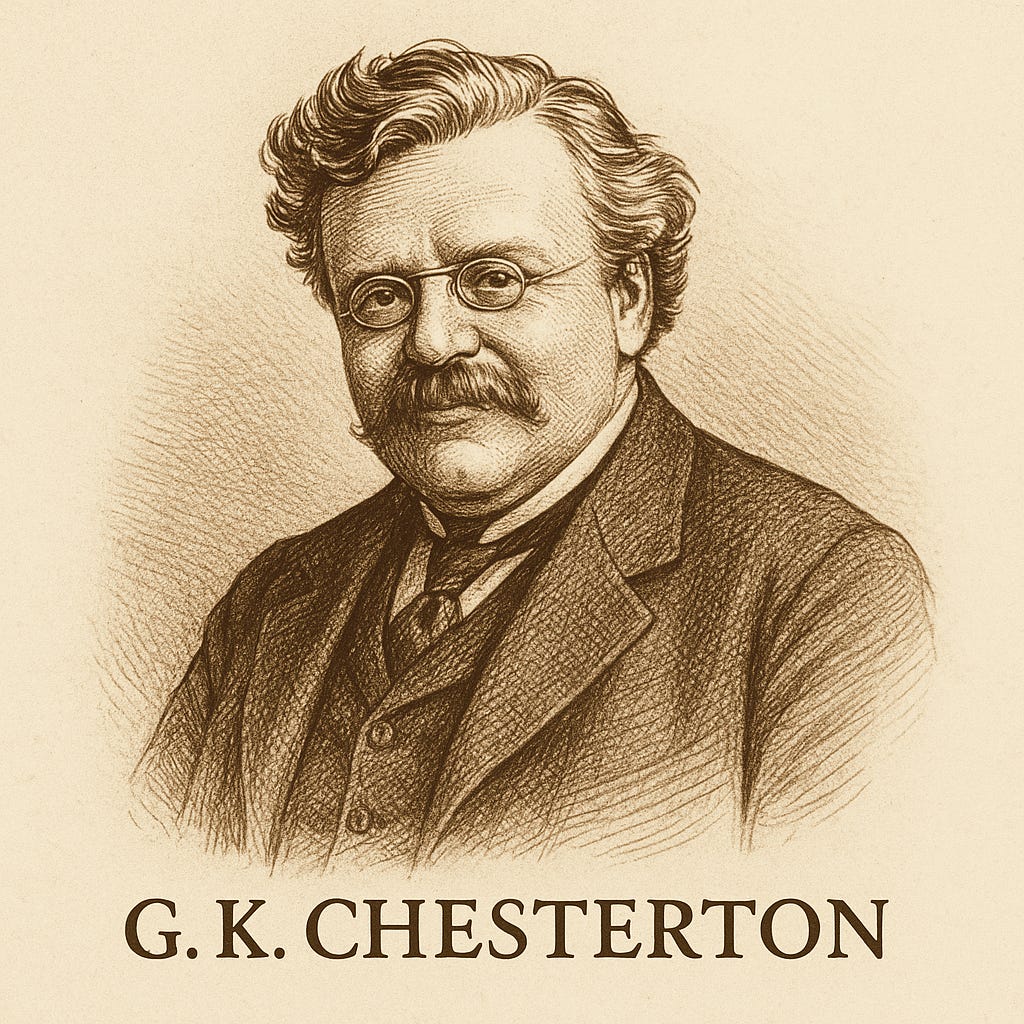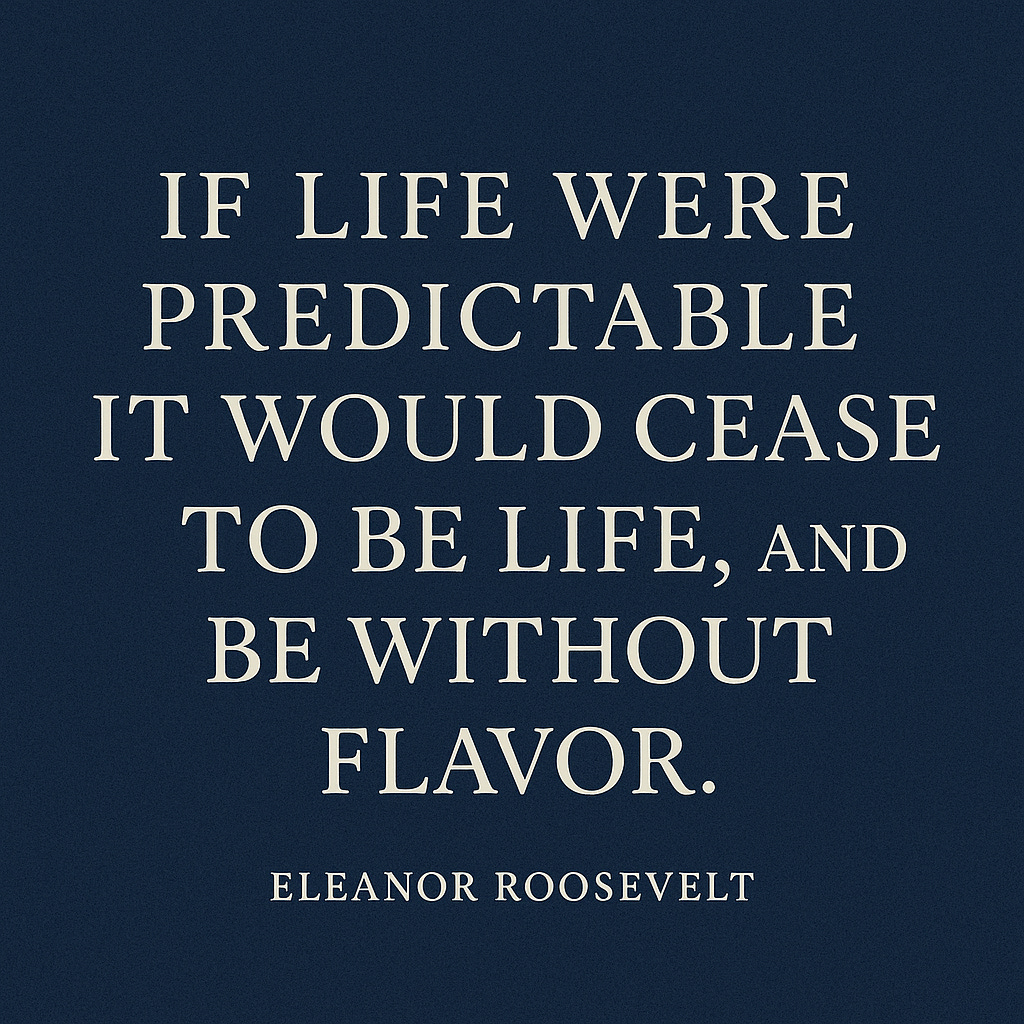The Money Mystic's Guide To Financial Sanity
Featuring G.K. Chesterton
One of the chief paradoxes of managing our money is that the concrete nature of numbers leaves us with a false sense of certainty despite the many (many) financial factors that are unknown, unknowable, or out of our control.
At best, this conundrum leaves us persistently second-guessing our financial decisions. At worst, we face crippling analysis paralysis—mentally exhausted and choosing nothing for fear of choosing wrong.
And it’s no wonder, because the pace of new, and often conflicting, information is increasing well beyond we can receive, much less apply, it. So, this week, we’re calling on the wisdom of early 20th Century writer, critic, contrarian, and philosopher, G.K. Chesterton. He might just offer us a key to saner financial planning.
And while Tony’s on a cruise ship right now—and not writing an investment commentary this week—we’ll still update you on the market metrics for the week behind us.
Thanks for joining us and spending a few moments of your precious weekend!
Tim
Tim Maurer, CFP®, RLP®
Chief Advisory Officer
In this Net Worthwhile® Weekly you'll find:
Financial LIFE Planning:
The Money Mystic’s Guide To Financial Sanity
Quote O' The Week:
Eleanor Roosevelt
Weekly Market Update:
Broad Softening
Financial LIFE Planning
The Money Mystic’s Guide To Financial Sanity
One of the chief paradoxes of managing our money is that the concrete nature of numbers leaves us with a false sense of certainty despite the many (many) financial factors that are unknown, unknowable, or out of our control.
At best, this conundrum leaves us persistently second-guessing our financial decisions. At worst, we face crippling analysis paralysis—mentally exhausted and choosing nothing for fear of choosing wrong.

And it’s no wonder. In Buckminster Fuller’s book, “Critical Path,” he set forth to capture the amount of years it has taken historically for the aggregate amount of information known by humans to double. He suggests that from the year 1 AD, “it probably took about 1500 years or until the sixteenth century for that amount of knowledge to double.”
1500 years. The next doubling took only 250 years, bringing us to about 1750; and the next only took us 150 years. By the end of World War II, knowledge was doubling every 25 years, and by the time Fuller’s book was published, it only took 12-13 months.
But the book was published in 1982! Imagine what it could be today.
The point is that we’re awash in information, and despite the momentary headlines that are published about the “new findings” or that which “studies suggest,” the fact is that “the more choices we have, the less likely we may be to select from any of them.” Of course, that, too, is what the studies suggest. 😊
G.K. Chesterton’s Sanity Of Mysticism
Long before behavioral economics became a field, the British writer and philosopher, G.K. Chesterton, was documenting the quirks of human nature. His observations about logic, choice, and sanity read like they could have been written yesterday by a Silicon Valley researcher studying decision fatigue, despite their authorship dating to the early 1900s.
“Mysticism keeps men sane. As long as you have mystery you have health; when you destroy mystery you create morbidity,” Chesterton wrote. “The morbid logician seeks to make everything lucid, and succeeds in making everything mysterious. The mystic allows one thing to be mysterious, and everything else becomes lucid.”
What Chesterton intuited a century ago, researchers have now quantified. Northwestern Mutual’s 2024 study found that financial ‘analysis paralysis’ is at record highs, with people feeling they’re “always reacting instead of controlling their own destiny.” The very tools we thought would make us smarter financial decision-makers may be making us more anxious instead.
Indeed, most financial advice follows the “morbid logician” approach Chesterton describes—trying to optimize, quantify, and control every variable. We’re told to track every expense, maximize every return, hedge every risk. Yet this often creates the very anxiety and paralysis it’s meant to solve.
Embracing The One Great Mystery
What, therefore, is the “one mystery” that can make our financial planning more lucid? I believe it is the simple fact that the future is unknowable. For example:
Should we cede a meaningful portion of our income today to save for recreating a stream of income to live off of many years in the future? Almost certainly, but could we die early, rendering all that money saved little more than joyful experiences unclaimed? Yes.
Should we spend a not inconsequential 1% to 3% of our annual income to properly protect against a loss of income in the case of a disability through disability insurance? Probably, but might we make it through our working years without ever being disabled, rendering the premium payments “wasted”? Hopefully.
Should we consider how a host of investment asset classes have performed historically in crafting a diversified portfolio today that is designed to grow our net worth for tomorrow? I think you’d be foolish not to, but is past performance the sole indicator of future results? Certainly not.
And once we’ve reached financial independence, should we retain enough assets to presumably sustain our lifestyle until we leave this Earth? It sounds wise, but could we—and our heirs—benefit more from giving portions of an inheritance while everyone’s still alive, so that it can be enjoyed collectively? I think so.
The paradox is frustratingly clear: Virtually every financial planning rule of thumb could be rendered wrong, depending on the unknowable nature of our future.
Money Mystic’s Guide
But surely we can’t anchor to this fact and use it as a license for money mismanagement! So, what are some ways we can find the path of wisdom as a skilled money mystic?
Set up robust systems while accepting they can’t account for every possible outcome. One of the best examples I can give you here is budgeting. It’s a practice I’ve submitted myself to for my entire adult life, and while it provides a form of solace—to know precisely where my family stands financially, weekly and monthly—it is also a regular source of frustration, as we have never once predicted every possible expense for our family of five in a single month. Ever.
Focus intensely on what you can control while releasing attachment (and stress) to what you can’t. You can control your spending and how much you save. You can also create a thoughtful diversified portfolio that is designed to help you grow, protect, give, and live your wealth.
Plan thoroughly but hold those plans lightly. Futurist and Stanford University professor, Paul Saffo, gave us the memorable phrase, suggesting that we should have “strong opinions, weakly held.” We should absolutely do the research, review the studies, follow the guidance, develop and then implement our plans. Yet, we should always be engaging in “creative doubt,” according to Saffo.
One of the best moves my wife and I have made is to explicitly put each of our expected monthly expenses into one of two categories: fixed and flexible. Those expenses that are the same every month—like our mortgage, phone, internet, and even our monthly giving—are in the fixed category. Then, for all the remaining expenses that could be different every month, my wife and I each have a flexible budget “account” for which we are responsible, and yes, accountable.
If you’re looking for a great online budgeting tool, Monarch makes offers a fixed/flexible feature that makes this process simpler, and YNAB (You Need A Budget) is still one of my all-time favorite budgeting tools.
The unnerving thing about wealth management, though, is that we don’t control a lot that can, and likely will, have a major impact on how much money we have and how far it will go. Market returns, for example, we can’t control, any more than we can economic conditions, inflation, monetary and fiscal policy, terrorist attacks, natural disasters, and the list goes on and on (and on). In fact, it only takes a matter of seconds to realize that there may be more that impacts our financial future that we don’t have control over than we do. Therefore, I believe we must…
I think doing so offers us (at least) a couple of benefits. For one, it leaves us open to new information and new possibilities. And second, our loosened grip makes us more malleable and willing to reposition ourselves, based on what that new information includes.
The Art Of Strategic Surrender
The financial mystic, then, is not someone who abandons planning or ignores data. Rather, they’re someone who has learned the art of strategic surrender—knowing when to lean into uncertainty rather than fight it. They understand that the goal isn’t to eliminate financial anxiety by controlling every variable, but to find peace by accepting the one great mystery that makes everything else clear: We cannot know what’s coming next.
This acceptance breeds wisdom, not passivity. It frees us from indecision born of fear and enables us to adapt, which often leads to outcomes that may even outshine our original hopes and expectations. And it positions us to capture the financial sanity that has eluded so many in our age of infinite choice.
While I can’t be 100% certain, I believe G. K. Chesterton would agree.
Quote O' The Week
Eleanor Roosevelt became the first First Lady to travel to an active war zone when she undertook a month-long journey to the Pacific warfront in 1943, visiting troops from Australia to Guadalcanal as a Red Cross representative:
Weekly Market Update
Markets broadly softened over the past week: U.S. equities ended modestly lower amid mixed economic signals and hawkish Fed rhetoric, while developed‐ and emerging-market stocks also slipped, driven by weakening global growth and rising rate uncertainty:
- 0.31% .SPX (500 U.S. large companies)
+ 0.10% IWD (U.S. large value companies)
- 0.67% IWM (U.S. small companies)
- 0.14% IWN (U.S. small value companies)
+ 0.34% EFV (International value companies)
- 0.60% SCZ (International small companies)
- 0.32% VGIT (U.S. intermediate-term Treasury bonds
Tony will be back next week with a new chart of the week and full market commentary!
It’s officially fall, folks, and I hope you’re enjoying it!
Tim




